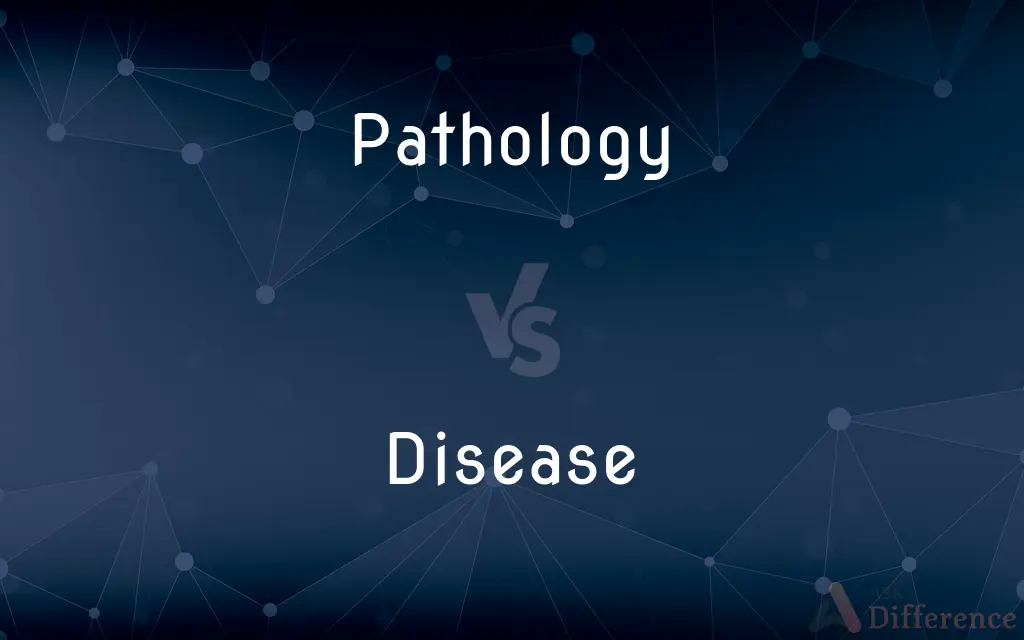Pathology vs. Disease — What's the Difference?
By Maham Liaqat & Urooj Arif — Updated on April 16, 2024
Pathology studies the causes, processes, and effects of diseases, focusing on their scientific analysis; disease refers to any condition that disrupts normal body functions.

Difference Between Pathology and Disease
Table of Contents
ADVERTISEMENT
Key Differences
Pathology is the medical science that investigates the causes, development, and effects of diseases, aiming to understand how various diseases affect the body. On the other hand, a disease is an actual health condition that affects an organism, disrupting its normal physiological functions.
Pathologists, professionals in pathology, work to diagnose diseases through laboratory tests and tissue analysis, contributing to the medical field by identifying the nature and cause of diseases. Whereas, diseases can manifest in symptoms and signs observable by patients and various healthcare providers, not just pathologists.
Pathology helps in the formulation of treatment by understanding the nature of diseases at a molecular and cellular level. In contrast, the concept of disease is more directly related to the patient's experience and the medical treatment they receive for their symptoms and the underlying health issues.
The field of pathology includes various specialties like anatomical pathology, clinical pathology, and forensic pathology, each focusing on different aspects of disease investigation. On the other hand, diseases are categorized by their symptoms, origin, or the body systems they affect, such as infectious diseases, genetic disorders, or cancers.
Understanding pathology is crucial for developing preventive measures and treatments for diseases, as it provides the scientific basis for interventions. However, managing a disease typically focuses on alleviating symptoms and curing the disease using the knowledge provided by pathology.
ADVERTISEMENT
Comparison Chart
Definition
The scientific study of disease
A condition that disrupts normal body functions
Focus
Causes, mechanisms, effects of diseases
Symptoms, treatment, management of conditions
Professional Involved
Pathologist
Doctors, healthcare providers
Contribution to Medicine
Diagnosis, understanding disease mechanisms
Direct patient care, treatment
Subfields
Anatomical, clinical, forensic pathology
Infectious, genetic, chronic diseases
Compare with Definitions
Pathology
A field that helps in formulating disease treatments by understanding disease mechanisms.
Advances in pathology have improved treatment outcomes for many diseases.
Disease
A health condition that can be chronic, acute, or subacute.
She suffers from a chronic disease that requires daily medication.
Pathology
The medical discipline focused on diagnosing diseases through laboratory methods.
Pathology results confirmed the diagnosis of diabetes.
Disease
An illness or disorder characterized by specific signs and symptoms.
He was diagnosed with Lyme disease after finding the characteristic rash.
Pathology
The branch of medicine that examines tissues and body fluids to identify diseases.
The pathology lab processed samples for urgent analysis.
Disease
A medical condition that negatively affects the structure or function of part or all of an organism.
Diabetes is a disease caused by impaired insulin production.
Pathology
The scientific study underlying medical practice and treatments.
Her research in pathology contributed to new insights into autoimmune disorders.
Disease
Often caused by infections, genetic defects, or environmental factors.
Heart disease can result from a combination of genetic and lifestyle factors.
Pathology
The study of diseases and their effects on the body.
He specializes in pathology to better understand cancer mechanisms.
Disease
Something that can be prevented, treated, or managed through medical care.
Many infectious diseases can be prevented through vaccination.
Pathology
Pathology is the study of the causes and effects of disease or injury. The word pathology also refers to the study of disease in general, incorporating a wide range of biology research fields and medical practices.
Disease
A disease is a particular abnormal condition that negatively affects the structure or function of all or part of an organism, and that is not due to any immediate external injury. Diseases are often known to be medical conditions that are associated with specific signs and symptoms.
Pathology
The science of the causes and effects of diseases, especially the branch of medicine that deals with the laboratory examination of samples of body tissue for diagnostic or forensic purposes
Research people skilled in experimental pathology
Disease
A disorder of structure or function in a human, animal, or plant, especially one that produces specific symptoms or that affects a specific location and is not simply a direct result of physical injury
Heart disease
Bacterial meningitis is quite a rare disease
Pathology
The scientific study of the nature of disease and its causes, processes, development, and consequences. Also called pathobiology.
Disease
An abnormal condition of a part, organ, or system of an organism resulting from various causes, such as infection, inflammation, environmental factors, or genetic defect, and characterized by an identifiable group of signs, symptoms, or both.
Pathology
The anatomic or functional manifestations of a disease
The pathology of cancer.
Disease
A condition or tendency, as of society, regarded as abnormal and harmful.
Pathology
A departure or deviation from a normal condition
"Neighborhoods plagued by a self-perpetuating pathology of joblessness, welfare dependency, crime" (Time).
Disease
(Obsolete) Lack of ease; trouble.
Pathology
The study of the nature of disease and its causes, processes, development, and consequences; now usually and especially in the clinical and academic medicine subsenses defined below.
Disease
(medicine) An abnormal condition of a human, animal or plant that causes discomfort or dysfunction; distinct from injury insofar as the latter is usually instantaneously acquired.
The tomato plants had some kind of disease that left their leaves splotchy and fruit withered.
Pathology
The clinical biomedical specialty that provides microscopy and other laboratory services to clinicians (e.g., cytology, histology, cytopathology, histopathology, cytometry).
The surgeon sent a specimen of the cyst to the hospital's pathology department for staining and analysis to determine its histologic subtype.
Disease
(by extension) Any abnormal or harmful condition, as of society, people's attitudes, way of living etc.
Pathology
The academic biomedical specialty that advances the aspects of the biomedical sciences that allow for those clinical applications and their advancements over time.
Those three pioneering pathologists went on to become leaders in building the pathology departments at several universities.
Disease
Lack of ease; uneasiness; trouble; vexation; disquiet.
Pathology
Any of several interrelated scientific disciplines that advance the aspects of the life sciences that allow for such technological applications and their advancements over time.
The plant pathology and vertebrate pathology programs of the university's biology department
Disease
(obsolete) To cause unease; to annoy, irritate.
Pathology
Pathosis: any deviation from a healthy or normal structure or function; abnormality; illness or malformation.
Some sort of renal pathology was suspected, but imaging and even biopsy found no discernible pathology, glomerular or otherwise.
Some sort of mental and social pathology seemed to sweep over the discourse later that autumn.
Disease
To infect with a disease.
Pathology
The science which treats of diseases, their nature, causes, progress, symptoms, etc.
Disease
Lack of ease; uneasiness; trouble; vexation; disquiet.
So all that night they passed in great disease.
To shield thee from diseases of the world.
Pathology
The condition of an organ, tissue, or fluid produced by disease.
Disease
An alteration in the state of the body or of some of its organs, interrupting or disturbing the performance of the vital functions, and causing or threatening pain and weakness; malady; affection; illness; sickness; disorder; - applied figuratively to the mind, to the moral character and habits, to institutions, the state, etc.
Diseases desperate grown,By desperate appliances are relieved.
The instability, injustice, and confusion introduced into the public counsels have, in truth, been the mortal diseases under which popular governments have every where perished.
Pathology
The branch of medical science that studies the causes and nature and effects of diseases
Disease
To deprive of ease; to disquiet; to trouble; to distress.
His double burden did him sore disease.
Pathology
Any deviation from a healthy or normal condition
Disease
To derange the vital functions of; to afflict with disease or sickness; to disorder; - used almost exclusively in the participle diseased.
He was diseased in body and mind.
Disease
An impairment of health or a condition of abnormal functioning
Common Curiosities
What do pathologists do?
Pathologists diagnose diseases by examining tissues, cells, and bodily fluids in the laboratory.
What is pathology?
Pathology is the scientific study of diseases, focusing on their causes, development, and effects on the body.
Can diseases be studied without pathology?
While diseases can be observed and treated, understanding their deeper mechanisms fundamentally relies on pathological studies.
Are all diseases curable?
Not all diseases are curable, but many can be managed or treated effectively with current medical knowledge.
How does pathology affect treatment decisions?
Pathology informs treatment decisions by identifying the precise nature and cause of a disease.
What are some common diseases?
Common diseases include diabetes, influenza, cancer, and heart disease.
How is pathology different from disease?
Pathology is the study of diseases, whereas disease refers to the actual condition affecting the body.
What role does pathology play in medicine?
Pathology provides critical insights that guide the diagnosis, treatment, and management of diseases.
What are the benefits of studying pathology?
Studying pathology helps in developing new treatments and understanding how various diseases progress and affect the body.
How does one become a pathologist?
Becoming a pathologist requires medical school followed by specialized training and residency in pathology.
Share Your Discovery

Previous Comparison
Brunch vs. Elevenses
Next Comparison
Drop vs. DipAuthor Spotlight
Written by
Maham LiaqatCo-written by
Urooj ArifUrooj is a skilled content writer at Ask Difference, known for her exceptional ability to simplify complex topics into engaging and informative content. With a passion for research and a flair for clear, concise writing, she consistently delivers articles that resonate with our diverse audience.
















































